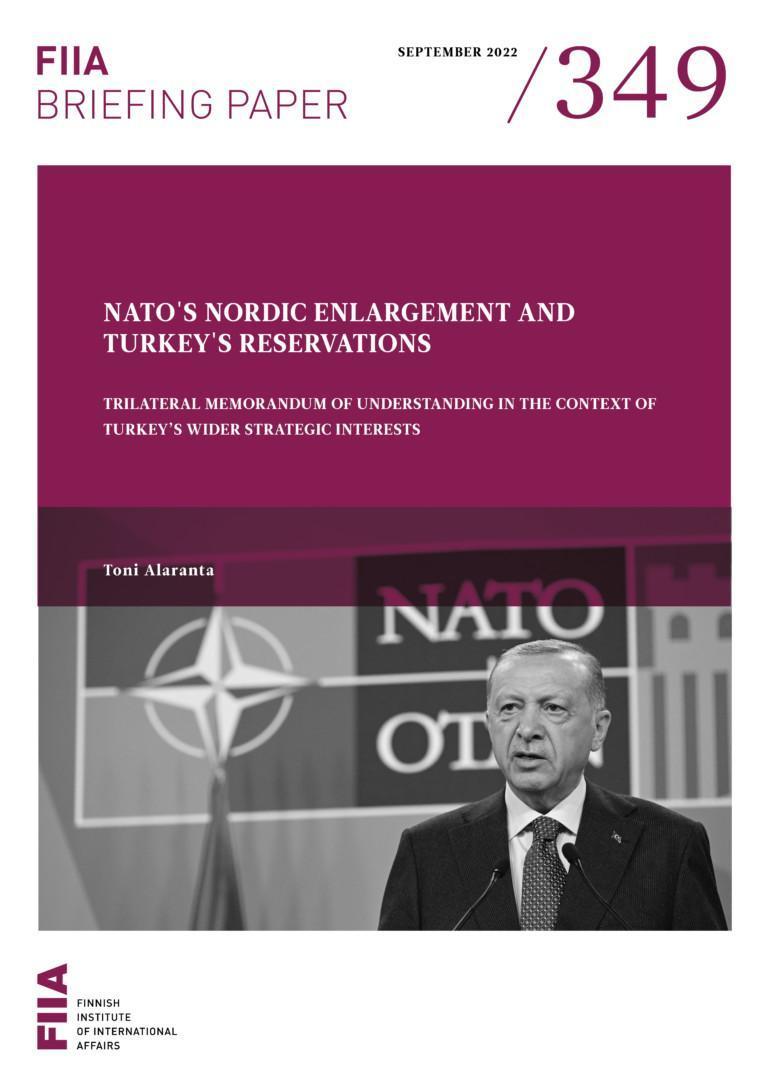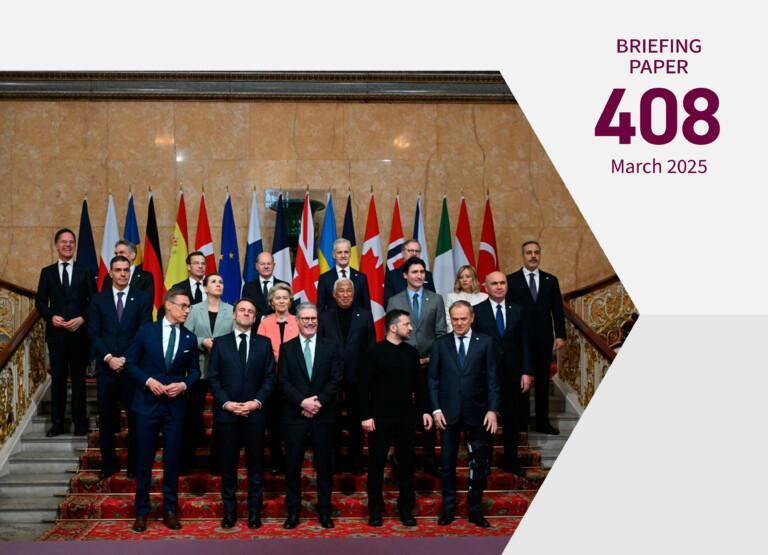
Turkey-EU relations are affected by Russia’s war on Ukraine and its consequences for the EU’s place in the world.
Another major factor is Turkey’s presidential and parliamentary elections held in May, which are defining the prospects for the country’s democratic future and its foreign policy.
The second round of the presidential election took place on 28 May. The re-election of President Erdoğan indicates that the unilateral foreign policy and strained relationship with the West is likely to continue, although there is a chance of a short-term burst of cooperation due to Turkey’s economic troubles.
There are increasingly divergent views about Turkey in the West, and the EU’s future relationship with Turkey needs to accommodate these different conceptualizations of the country as a state actor.
The EU needs to be flexible in the coming months and to find ways to engage with Turkey in a more fruitful manner, irrespective of the election results.
Introduction
Turkey-EU relations have always been affected by variables at different levels: Turkey, the European Union, their shared neighbourhood, and the global scene. Regarding the domestic situation in Turkey, the election period clearly energized civil society and the opposition parties in search of a wide democracy platform. On the other hand, the first round of the presidential election and the ability of the ruling coalition – comprising the Justice and Development Party (AKP) and its ultra-nationalist partner, the Nationalist Movement Party, as well as minor conservative and Islamist parties on their side – to reclaim their parliamentary majority already indicated that incumbent President Erdoğan still has the ability to define the country’s direction. This was indeed confirmed in the run-off. Nevertheless, the elections show that Turkey is standing on a very real threshold in terms of its democratic future.
In the global context, key events shaping EU-Turkey relations historically have included the end of the East-West conflict (1989), the 9/11 attacks, the subsequent war on terror and its global political implications (2001), and the so-called Arab Spring (2011) revolutions in the MENA region. Now one can legitimately ask what the implications of the Russian war against Ukraine might be for the EU-Turkey relationship. In recent years, the main obstacle to closer cooperation has been Turkey’s authoritarian development, during which the relationship has largely been transactional, focusing on managing certain key interdependencies such as trade and refugees. Responding to Russian aggression, EU enlargement in the Western Balkans as well as initial talks about Ukrainian membership have become part of the EU’s foreign policy agenda. Putting all these developments together, it is clear that a lot is at stake regarding the future parameters of EU-Turkey relations.
This FIIA Briefing Paper discusses the defining factors of future EU-Turkey relations. It first outlines the current mechanisms at play. After that, Turkey’s position in terms of the Ukraine war and the transforming international system is briefly analyzed. This is followed by an analysis of the kind of ‘window of opportunity’ that was provided by the election period, the opposition block’s attempt to oust Erdoğan’s competitive authoritarian presidential regime, and the extent to which the opposition shares a group of foreign policy views with Erdoğan’s government.
Current state of play in EU-Turkey bilateral relations
Seen from the EU’s perspective, at least in the short term, EU-Turkey relations are to be increasingly addressed in the context of a larger debate regarding the nature of the international order after Putin’s war, and its consequences for the EU. According to one prominent observer, the West will now need to work with states beyond the club of democracies in order to effectively respond to Russia’s aggression.[1] Turkey, as an EU candidate state and a long-time NATO ally, is definitely one of the states currently beyond the club of liberal democracies that the EU would like to see among its partners. Many analysts have underscored that the outcome of the presidential and parliamentary elections in Turkey will have immense importance for the future of EU-Turkey relations. This was based on the conviction that an opposition victory and a new government would reset Turkey’s relations with the West.[2]
It must be noted, however, that a more liberal and Western-oriented stance is internally challenged by a strong nationalist and – in terms of foreign policy – sovereigntist doctrine, also within all major opposition parties. This means that the EU-Turkey relationship is highly unlikely to take its previous form, whereby the EU defines the conditions of EU membership and Turkey is expected to implement them. Rather, Turkey’s outlook on foreign policy and conception of its place in the world seeks a new bargain and terms of engagement with the Western world, in a manner and scale that are, at least partly, likely to outlive President Erdoğan’s rule. Further, even though the main opposition Republican People’s Party (CHP), for instance, is indeed inclined to reinvigorate Turkey’s ties with the United States and the EU, it can be expected to maintain the strongly nationalist position regarding the Eastern Mediterranean and the Cyprus question. It will in all likelihood also try to maintain Turkey’s good relations with Russia, albeit possibly finetuning the current balancing act to some degree in favour of the West.
After acknowledging the expected continuities, it must be noted that Turkey’s recent revisionist and unilateral foreign policy has been crucially linked to President Erdoğan’s authoritarian domestic project. These domestic drivers have undergone crucial changes in the last ten years, generating a weakening of Turkey’s bond with Western states. On the other hand, there are also mechanisms, such as the opposition's tendency to anchor its democratization efforts in the EU's liberal democratic practice, which, if nurtured by European states, could allow for a much more cooperative relationship in the long term. It now seems, however, that these will remain latent, unable to affect the functioning logics of Erdoğan’s regime. The opposition candidate’s victory would have forced the EU to quickly adjust its policies to such a new reality, and provide meaningful support. The continuation of President Erdoğan’s competitive authoritarian regime, however, also requires a new approach from the EU.
Studying EU-Turkey relations has always been challenging, not only because of Turkey’s domestic transformations but also due to the EU’s character as an institutionally ambiguous actor. The European Council has always defined the main steps, grounded in wider strategic considerations, which themselves are based on a bargaining process between the members states. However, the Commission and the Parliament have also been consequential in providing the pathway for enlargement negotiations and their management, and by underscoring the normative precondition for the EU’s engagement with Turkey, namely presenting an array of expected advancements in human rights and rule of law procedures as a precondition for EU membership. In recent years, a characteristic trend in this respect has been that all these EU institutions have gradually distanced themselves from Turkey’s EU accession prospects.[3] This mainly reflects the idea that the EU is implementing what has been called ‘strategic patience’, namely waiting for a post-Erdoğan era, in which a more constructive EU-Turkey relationship could again be on the cards.
To a large extent, the ‘strategic patience’ has in fact implied the lack of a more long-term strategy, focusing instead on managing certain key interdependencies: refugees, energy, security, economy, and transportation. It is rightly perceived that trade and strong economic relations can prevent a full-blown break in EU-Turkey relations. However, as the last ten years have shown, this can nevertheless be accompanied by otherwise highly adversary politics, pushing Turkey and the EU on a collision course in their shared neighbourhood. This has resulted in a profound controversy about how to best engage with Turkey in the new, increasingly multipolar world characterized by geopolitical and geoeconomic competition.
One also needs to recall how the poisonous relationship resulted, at least initially, from the EU’s inability to use its conditionality framework in a coherent manner regarding the Cyprus question. At the beginning of its rule, Erdoğan’s government abandoned a long-term uncompromising nationalist position on Cyprus, fully supporting the 2004 UN plan for unification of the island based on a bi-communal federal state. After the Greek Cypriots voted against this, the EU nevertheless approved the membership of the Republic of Cyprus. This has not been forgotten in Turkey, and the issue will haunt EU-Turkey relations irrespective of which party governs Turkey in the coming years.
Turkey’s position in terms of the Ukraine war and strategic competition
Russia’s war on Ukraine and Turkey’s ongoing balancing act between the West and Russia has thus far generated a rather lively debate about Turkey’s role in the world. Turkey has provided Ukraine with significant weaponry and other materials needed in halting the Russian invasion. It has also systematically condemned Russian aggression both in terms of the occupation of Crimea since 2014 and the full-scale invasion starting in spring 2022. In addition, Turkey has taken an active role in mediating between Ukraine and Russia, by helping to arrange prisoner swaps and brokering the Black Sea Grain Initiative, which has enabled Ukrainian grain to reach global markets.
On the other hand, Turkey has systematically rejected any participation in Western-led sanctions on Russia, and there are many indicators that Turkey has been one of those states, together with India and China, for instance, that have enabled Russia to keep its war economy going during the first year of its invasion. In this sense, Turkey has coherently followed the policy it proclaimed at the very start of the war: the country will not burn bridges either with Ukraine or with Russia, but instead continues to maintain cooperative relations with both.
In these circumstances – a major war in Europe and an array of crucial question marks regarding Turkey’s domestic developments – Turkey-EU relations can take vastly different paths in the coming months. Traditionally, there is no lack of differing views within the EU as many member states approach Turkey from the perspective of their own priorities and specific interests. When it comes to conceptualizing the big picture, there are, however, roughly two interpretative frames: The first view ultimately frames Turkey as an indispensable ally that has its own long-term demands, often putting it at odds with a group of EU states and which, under President Erdoğan, has been a vocal and difficult actor to accommodate. In this view, all current troubles notwithstanding, Turkey is seen as a crucial NATO ally and the EU’s strategic partner. This is a view that can be defined as a conservative or traditional Euro-Atlantic conceptualization of Turkey as a state actor. This view also acknowledges that the EU is partly to blame for the increasingly deteriorating EU-Turkish relationship.
The other interpretation, by contrast, underscores that in recent years, Turkey has undergone a major transformation in its state identity and has already taken several steps that have made it a profoundly revisionist state. Turkey is seen as eager to challenge American and European ideas and arrangements, increasingly cooperating with Western adversaries such as Russia, and undermining the multilateralism advocated by the so-called liberal international order by exhibiting unilateral and aggressive behaviour. In this view, the long-term fundamentals of the EU-Turkey relationship, such as close economic interdependence, are also seen as evaporating as Turkey increases its trade with Russia and other non-EU states.
In order to grasp where Turkey stands, one needs to situate it within the larger debate on the so-called liberal international order and its alleged disintegration. Thus, rather than trying to push Turkey into either of the two frames presented above, it is more fruitful to re-conceptualize the liberal international order not as a globally agreed order existing from 1945 to the present, but as dynamic and contested instead. That is, the liberal order was never fully in place but only partially implemented, delimited both geographically and practically. A well-defined liberal international order is a rhetorical construction that does not by itself correspond with the real-world events and practices witnessed globally in the post-World War II era. Redefined as contested and changing, the liberal order’s transformation also becomes less dramatic, allowing for a more flexible analysis in terms of how various state actors position themselves in the present.[4]
This is further underlined when revisionism is understood to consist of two qualitatively distinct manifestations, namely normative and distributive. Accordingly, normative revisionism represents fundamental opposition to the norms, rules and institutions that produce the existing order, while distributive revisionism is about demanding reforms and enhanced status within the existing order.[5] In large part, Turkey’s revisionism has thus far still been more of the distributive type.
At least by now, it seems that Russia’s war against Ukraine reinforces the tendency whereby Russia and China strengthen their cooperation, while the US and the EU attempt to gather all states of the ‘non-geographic’ West in a united front.[6] This tendency, if becoming a more permanent feature of international relations, is not well received by Turkey or other Middle Eastern states keen to continue their working relations with both Western states as well as Russia and China.
On the EU’s side, the attempt to deter Russia, to increase European defence capabilities, and to better respond to non-members’ drive to seek closer partnerships with the Union has produced a whole array of arrangements that are likely to stay on the EU’s agenda and also deeply affect relations with Turkey. These include the newly invigorated debates about EU enlargement in the Western Balkans, rhetorically opening an EU prospect for Ukraine, strengthening EU-NATO security cooperation, and attempts to gather EU non-member partners into a wider cooperative circle, recently exemplified by President Macron’s initiative for a European Political Community (EPC).
Short-term expectations and future possibilities
Talking to analysts closely following the stance on Turkey taken by different governments in EU countries, no one expects Turkey to ever become a member, irrespective of who rules the country or whatever the level of democracy and the rule of law. On these grounds, one could argue that it would be much better for the EU to openly admit this fact and then proceed accordingly, implementing a well-thought-out plan on how to arrange relations with the country. Therefore, it is highly recommended for the EU to be flexible and to analyze various forms and institutional arrangements with regard to how to deal with Turkey, also beyond the EU membership process.
It seems that during the campaign period both the EU and Turkey’s opposition still perceived the EU accession process as a useful tool to implement reforms in Turkey and provide it with external backing. However, for several years now, it has been necessary to contemplate various alternative arrangements beyond the EU accession process that could help find a meaningful way to arrange EU-Turkish relations. The European Political Community is a new initiative that could provide a meaningful way for the EU and Turkey to engage with each other. In this respect, the comparison to the EU’s relationship with the United Kingdom can provide some clues. The UK is currently to some extent an economic competitor of the Union, but at the same time it is very much a key partner in security policy. Turkey’s role has recently been publicly defined by the EU in its Strategic Compass, where the country seems to be both a key partner with which the Union hopes to address the challenges emanating from the neighbourhood, but also a security threat in itself in the Eastern Mediterranean. Turkey is engaged in a conflict-oriented arms race with Greece and Cyprus in the Eastern Mediterranean, while France sees its own national interests in the region challenged by Turkey. If Erdoğan’s authoritarian presidential governing model endures, both parties should finally move beyond the “politics of pretending”[7] in terms of Turkey’s EU accession process, and arrange their bilateral relationship in an honest manner, finding ways to cooperate when possible.
Turkey's relationship with Russia raises the question of to what extent it is a wild card that the EU needs to manage and contain, given Turkey’s purchase of the Russian S-400 air defence system, the construction of Turkey's first nuclear power plant by Rosatom, and the above-mentioned increased trade relationship. In this respect, the question of what kind of coalition will rule Turkey in the future is of significance as the opposition would likely abstain from the kind of unilateral and aggressive policies that have characterized Erdoğan’s era.
On the other hand, whether Turkey is ruled by the current regime or any upcoming opposition bloc, the EU should also encourage Turkey’s recent attempts to normalize relations with its long-term adversaries in the Middle East, including Syria. It is still too early to say to what extent President Erdoğan’s attempt to rebuild relations with regional states is based on his short-term election calculations, but what is clear is the desire of Turkey’s citizens to leave behind strongly interventionist regional policies and rebuild relations with neighbours. The EU should support this desire, even if it seems counter-intuitive or to partly contradict its own alleged interests.
Nothing positive has resulted from Turkey’s regional power projection after it turned from a cultural, soft power approach to a militaristic one. The bleak state of the Syrian territories under Turkish rule also clearly demonstrates that there is no reason to perpetuate Turkey’s occupation.[8] Rather than obstructing a Turkey-Syria rapprochement, the EU should encourage a normalization process that balances the interests of the states of Turkey and Syria with the interests of Syrian Kurds and Sunni opposition groups, while simultaneously ending the state project implemented in the Idlib province by the Salafi-jihadist Hayat Tahrir al-Sham terrorist group. At present, the EU has few channels and very little leverage to influence Syria’s political future.
Foreign policy has not been a major issue in Turkish election debates. Kemal Kılıçdaroğlu, Erdoğan’s main challenger in the presidential election, nonetheless promised Turks a visa-free passage to the EU’s Schengen area if he were elected to power, starting as early as July. This is an issue that has been promised several times in recent years. However, the EU has set a precondition: Turkey’s anti-terror legislation must be brought into line with the EU legislation first. This would of course mark a major change in Turkey, as it would imply that journalists would not face imprisonment for covering security- related state policies, and nor would peaceful demonstrators be imprisoned.
As this clearly shows, securing visa-free travel is not a matter of months but years, requiring both trust-building measures between the EU and Turkey, and painstaking reforming of Turkish legislation and practices. However, a debate has emerged among analysts regarding the extent to which EU member countries even wish to see a change of regime in Turkey. This debate focuses on the Turkish opposition's strategy of anchoring its democratizing platform to the EU accession process, its implicit expectation that the EU will revitalize Turkey's membership process, and its attempt to renegotiate the refugee issue with the EU.[9] One must also acknowledge that it is not inconceivable that some conservative circles in EU member states would actually prefer Erdoğan’s regime to any secular, generally pro-European government: an Islamist and authoritarian regime in Turkey is the perfect ‘other’ for these groups, functioning as a useful way to exclude Turkey from the EU.
On the other hand, analysts close to the German government have indicated that Germany and France are currently closely coordinating their Turkey policy. For these countries, helping Turkey back to a more democratic and predictable domestic rule, as well as closer alignment with EU foreign policy, is a major priority. From these premises, the two were preparing a reciprocal policy in the event of a democratic opposition coming to power. This would have meant negotiating with Turkey about the modernization of the EU Customs Union and visa-free travel to the Schengen area, had the new government after the elections taken positive steps in terms of basic rights and the rule of law in particular.
The scenario whereby the opposition candidate would have won the second round of the presidential election, and Turkey would have re-established a parliamentary democracy, would have naturally allowed a clean slate for EU-Turkey relations. Few, however, expected a smooth transition to democracy, or an easy way to rebuild relations. It was also a genuine concern whether or not a democratic change of government was still on the cards, and these worries were only exacerbated after recent comments by Turkey’s leadership, which seemed to equate the opposition’s victory to a political coup attempt. In any case, knowing the nationalist and status quo-oriented Turkish conservative voter base, incumbent President Erdoğan was well placed to secure his position at the helm in the run-off. In addition, the current governing coalition, composed of Erdoğan’s AKP and its ultra-nationalist partner MHP, secured its majority in parliament, indicating difficulties even if Kılıçdaroğlu had won the presidency.
Turkey is currently absent from the EU’s main grand-scale planning, whether this concerns the Green Deal, various connectivity schemes, or EU enlargement. Further, it is reasonable to argue that some of the key issues causing tension and hindering cooperation, such as the Cyprus question, the Kurdish question and Turkey’s relations with Russia, will remain on the agenda in one form or another also after the May elections.
Conclusions
The coming months are likely to indicate the direction that Turkey will take for years to come. The EU institutions and members states’ governments need to be prepared for both the worst- and best-case scenarios. Both Erdoğan’s government and the main opposition parties conceptualize the ongoing transformation from Western-dominated to a more pluralist international system as an at least partially healthy development – an era of rupture during which some of the more dysfunctional elements of the Western-led international order can be addressed. On the other hand, it is obvious that the risks and possible threats generated by the systemic competition are also recognized among Turkey’s state elites.
Much consequently depends on the ideological characteristics of the future ruling coalition: a domestically more democratic and pluralist government that also needs to consider the views of the more Western-oriented middle classes is likely to push for a more cooperative foreign policy, both in terms of the EU and Turkey’s immediate neighbourhood. On the other hand, it is unlikely that these factors will have much influence on President Erdoğan now that he has managed to secure re-election and further consolidate his power with nationalist and conservative partners in parliament. The EU must be prepared to design a credible long-term approach to Turkey as the current strategy of waiting for a post-Erdoğan era has long been dysfunctional, and is of course even more so at present. This requires creating a form of engagement beyond the EU accession process.
Endnotes
[1] Laffan, Brigid (2022) “Can collective power Europe emerge from Putin’s war?” Seventh Annual T.M.C Asser Lecture, September 2022.
[2] Esen, Berk (2022) “Post-2023 Election Scenarios in Turkey”. SWP Comment No. 55, September 2022.
[3] Reiners, Wulf and Ebru Turhan (2021) “Current Trends and Future Prospects for EU-Turkey Relations: Conditions for a Cooperative Relationship” in EU-Turkey Relations: Theories, Institutions and Policies, edited by Wulf Reiners and Ebru Turhan, pp. 397–431. Cham: Palgrave Macmillan.
[4] Eilstrup-Sangiovanni, Mette and Stephanie C. Hofmann (2020) “Of the contemporary global order, crisis, and change”. Journal of European Public Policy 27 (7) 2020: 1077–1089.
[5] Ward, Steven (2017) Status and Challenge of Rising Powers. Cambridge University Press, pp. 16–17.
[6] Lehne, Stefan (2023) “After Russia's War Against Ukraine: What Kind of World Order?”. Carnegie Europe, 28 February 2023. https://carnegieeurope.eu/2023/02/28/after-russia-s-war-against-ukraine-what-kind-of-world-order-pub-89130.
[7] Alaranta, Toni (2016) “The EU-Turkey stalemate: Detecting the root causes of the dysfunctional relationship”. The Finnish Institute of International Affairs, 9 September 2016. https://fiia.fi/en/publication/the-eu-turkey-stalemate.
[8] Tsurkov, Elisabeth (2023) “The Gangs of Northern Syria: Life Under Turkey’s Proxies”. Newlines Institute, 27 December 2023. https://newlinesinstitute.org/syria/the-gangs-of-northern-syria-life-under-turkeys-proxies/.
[9] Taspinar, Omer (2023) “‘The devil we know’: Does the West want Erdogan to win?” Ekathimerini, 1 May 2023. https://www.ekathimerini.com/opinion/1209924/the-devil-we-know-does-the-west-want-erdogan-to-win/.









